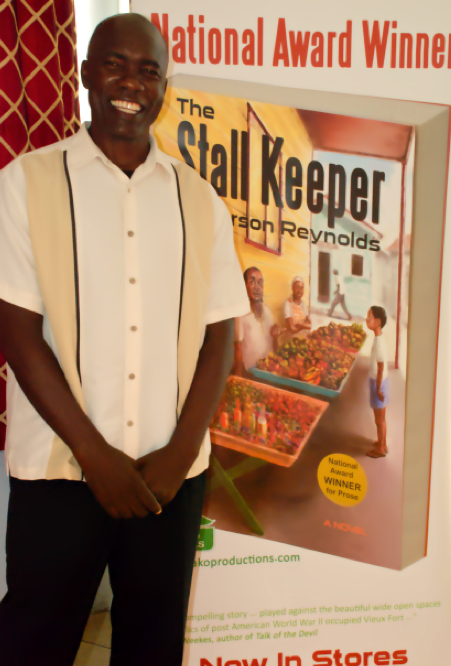In Anderson Reynolds’ novel, The Stall-Keeper, set in the 1950s in Vieux Fort, a town in the south of St. Lucia, a gifted young man, Reuben, encounters and falls in love with Eunice, an attractive if somewhat forbidding widow. This makes for engaging reading, for their love can only be consummated if one of them at least gives up entirely what is most dear to them—their entire life’s purpose.
At the beginning of the story, Reuben is the most outstanding sportsman in his hometown. Every Saturday on the sports field Reuben delights his hometown with his prowess at sports, either with his exquisite run-scoring stroke play on the cricket pitch or his deft footwork on the football field. Reuben is also considered a brilliant primary school teacher as well as a budding orator and politician. Reuben’s community is proud of him, seeing him as bringing glory to the reputation of their small town. Reuben is a young man fully integrated into his society and the mundane world.
Eunice, on the contrary, is a woman whose consciousness straddles two worlds. A woman who takes guidance for her life from her dreams and the voices that whisper to her from somewhere in her consciousness. These, for the most part, are quite benign, but Eunice is also prone to seeing quite mundane occurrences, as vegetables grown in her garden spoiling prematurely and the appearance of toads in the vicinity of her home as evidence of the malevolence of her neighbors and their desire to harm her in some way. However, Eunice was not always that way.
Eunice grew up attending a Roman Catholic school in a predominantly Catholic community and had expressed the intention of becoming a nun. She was encouraged by the Sisters who taught and guided her spiritual life, but all this changed when, in her early teens, Eunice, in the course of bathing and laundering in a river with her peers, encountered a young man with the darkest of complexion and flashing white teeth.
Dreams and visions now guide Eunice’s new life. At this stage in her life story, Eunice is a young woman who has abandoned the Roman Catholic Faith in which she was born, was married at fifteen to the man literally of her dreams, the main catalyst to an instantaneous conversion to the Seventh Day Adventist Church. A fisherman, in his short lifetime, disappeared mysteriously at sea, leaving Eunice a widow, with a child, Henry, a boy who has developed the peculiar trait of walking up to male passersby and asking them if they are his father.
We see Eunice now a staunch Seventh-day Adventist, estranged for the most part from the community in which she lives, seeing it as riddled with pitfalls that will lead to damnation. After all, Saturday is a day that should be dedicated to a strict observance of the Sabbath. Henry, her son too, must be protected from the world of frivolous play and childish gossip. He must also be made to end his burgeoning friendship with Eugene, a deeply effeminate man, a hawker of fruits and vegetables in the company of women, and the Stall keeper of the novel’s title. However, in spite of Eunice’s admonishments and rumors of inappropriateness in the community about the relationship between Eugene and Henry, Henry maintains his friendship with the man whose peculiarities fascinate him and who will play a very salutary role in his development that the community of rumor mongers could never have foreseen.
Meanwhile, Reuben’s passionate love for Eunice and his conviction that bringing her into his life would complete him meet its own impediments. Her stipulation and that of the Adventist community to which she belongs that this can only be realized if he is converted to her faith is more of a challenge than Reuben foresaw. Come Saturday mornings, a choice has to be made between being on the sports field or in the Adventist Church, exulting in worship and plunged into Bible study. Faced with this dilemma, Reuben can undergo anything from paralysis to amnesia regardless of the fact that his happiness is at stake.

Eunice, too, suffers in patience. She, too, wants them to be together, but how long will the Adventist community wait for Eunice to bring him into the fold from which she cannot see herself departing? Fulfillment is slipping away from them.
The Stall Keeper deals with the themes of man as body and spirit, as individual and member of a community, and the search for self-actualization through the conflict these dualities pose. The novel demonstrates how failure to negotiate between these dualities can have tragic consequences.
About Allan Weekes
Allan Weekes is a retired English and literature lecturer. He has also taught French and second language methodology. He was a member of the famous St. Lucia Arts Guild, and is a literary critic, a creative writing coach, and a theatre director. He founded the Creole Theatre Workshop, which under his direction presented his Kwéyòl translations of the early Derek Walcott plays. He has published An Introduction to Kwéyòl (with D. Jamala), and a play, Talk of the Devil.
Other Allan Weekes related post
Allan Weekes “Mapipi” Kwéyòl And Cultural Hero
Book Review—”They Called Him Brother George: Portrait of a Caribbean Politician”
![]()





